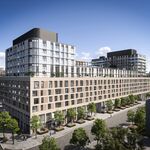Walt:
I agree with your statement that there is not necessarily a big difference on some issues between the 905 and 416. However I do think that it also depends on the terms and deffinitions you use for each of these areas. It would be not too far off to assume that someone living in North York is likely to be have a fair bit in common with someone from Markham. But someone living at Bloor and Dufferin compared with someone living in Vaughan or Newmarket is going to yield a greater diversity in opinions.
One thing I did originally mention in my post was that my concern is not just with the GTA, but all of Ontario as whole. It is bound to happen that the suburbs bordering Toronto are likely to find themselves desiring more transit service and with development spilling over, finding that urban issues are more relevant too them. And even if we say that 5 million of the GTA's residences are concerned about urban issues (assuming everyone in Toronto and the immediate suburban cities share the same, strong concern), this is likely to drop off greatly once you leave this area.
Its cities like London, Kingston, Kitchener, Waterloo, Cambridge, Barrie, suburban regions of Ottawa such as Barrhaven, Orleans, and Kanata, Sarnia, Windsor, Chatam, and all the smaller towns and cities in the southern Ontario region. When you look at development in these and smaller cities, there is almost nothing resembling any concern regarding urban issues and sprawl. Again, I go back to the idea of driving down the 401 20 years ago and comparing then too today. Its been the growth outside of the GTA that I often find to be most horrific. While one doesnt think of these smaller cities as having an impact on land use, when you add up their total populations and their increasing proximity to major work centers, it is these places that one day are quiet little cities, and the next, find themselves swimming amidst a sea of sprawl.
Pickering, Ajax, and Whitby now represent one giant monoblob of suburbanity. Oshawa too has continued to creep along. Port Hope, Colborne and Cobourg, all increasingly closer to the GTA, are no longer just small, somewhat out of the cities, but finding themselves in a position where they are poised to become the newest addition the GTA suburban community. Once this happens, those cities, where land is still cheap and developers are just waiting to for that right momment, are going to become over boom towns with sprawl taking the lead.
Maybe the use of the term 905 to describe an Anti-Toronto if you will was not the most accurate. But I would still stand by my original thought that when comparing Toronto, and some of the more urban fringes of its suburban neighbors, to that which lies far beyond it and still composes a majority of people, that there are strong differences.
There has no doubt been some good progress made in the past 10 years to bring urban issues to the public and begin addressing many concerns that people in cities such as Toronto or Vancouver have. And even some of the suburban areas are catching on and slowly starting to rethink their own ideologies in terms of planning and how their cities are going to function in the future (Mississauga being a good example of a city that, despite some negative criticism that it gets, is at least making genuine attempts to figure out how it will grow and mature in the coming years and how it will progress).
But unless you are reading the Toronto Star or watching CBC or TV Ontario, these issues still get almost coverage and are not part of the political discourse outside of the more urbanized areas of Toronto. Until you can get a large majority of Ontarians (and Canadians on the federal level) to understand the importance of these issues, its only going to sit in a stalemate. The average voter in Thunder Bay or Kingston, or the 20% of rural Ontarians, or those not immediately affected by these issues, dont care. Many of these districts still salivate over the thought of big box development and highway projects and arent likely to care that Toronto is chocking under its smog and congestion.
Its the Rest of Ontario paradigm shift that needs to take place before any real action is ever going to happen. Its also, rather unfortunately, the one that is going to require the most extreme circumstances before it actually affects them enough for there to be a widespread concern for urban issues.
To take a view from the other side, from the Rest of Ontario if you will, there are also a lot of issues that are affecting them that often get ignored by the urbanized areas of Ontario as well. Rural issues are an excellent example of this. Yes we hear lots about Mad Cow and trade with the US being cut off, and other 'big' issues. But rarely ever do you see coverage that talks about agribusiness buying up small farms, or setting up pig farms that create an incredible amount of pollution. land speculation is another issue. Even in Kingston (Im using this as an example often because my family is from there so its a city Im very familiar with) there are farms that find themselves being threatened by real estate speculation. In smaller cities and communities where this is an important part of their culture, and how many of people survive, these are very important issues that almost get entirely ignored.
Perhaps part of the problem is simply inward thinking? I often hear plenty of comments, on this forum, in newspaper, magazines, and other media, that Toronto is all but ignored by the rest of Ontario and Canada. And I would agree that in many cases that is true. But the same is true for other parts of Ontario by Torontonians. Give a little, take a little I believe the saying goes.
However, I return to my original pesimistic attitude that in order for the changes to really begin to take place, their needs to be a shift in the fundamental way we view our cities and all the regions of Ontario (and going further, Canada). Right now, it seems as though the private ownership, me society has the stronghold grip over these decisions which results in a battle between cities and suburbs and rural where each place attempts to get what it can with little regard to concerns for the other. It wont just take a simple 'traffic is shitty and I want a bus or commuter train because I cant stand sitting in traffic for 4 hours a day' train of thought to see change actually take place. It is going to take something radical along the lines of 'I cant believe that the GTA has become so big that I can drive 3 hours on the 401 and the closest thing to country side I have seen is the airport'.
When we hear someone in Markham say 'I think we need to do something about our cities so that our actions here are not pushing farmers off their lands in Orillia or Brockville' or you hear someone in Sarnia say 'I think we need to address the problems that are affecting Toronto and other urban regions' then real change will be on the way. Until then, its largely hot air and political rhetoric that will result in little action, letting sprawl continue its reign.





